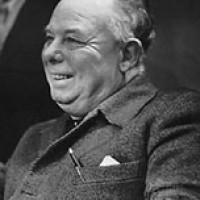Jean Renoir (born on September 15th, 1894), French director, screenwriter, and actor, was a son of the impressionist painter Auguste Renoir. He studied mathematics and philosophy, but joined the cavalry in 1913 and passed the officer’s exam the very next year. Shortly after the beginning of WW I he badly injured his leg, but soon returned to war as a pilot. Because of his poor health he was withdrawn from the army and stationed in Paris where his interest in film arose. After his father’s death and his marriage to a model/actress Catherine Hessling, he started a production company and made his first silent movies casting his wife in the lead. He had to wait for recognition and commercial success until his first sound films:
The bitch (La chienne, 1931),
The Lower Depths (Les bas-fonds, 1936),
The Big Illusion (La grande illusion, 1937), one of his most famous projects and
The Human Beast (La bęte humaine, 1938), a
film noir based on a novel by Émile Zola. The film
The Rules of the Game (La regle du jeu, 1939), a satire of contemporary French society, was rated badly by critics and audiences alike. Therefore, soon after its first screening, it was withdrawn from distribution and re-edited. In the early sixties the film was restored and redistributed, emerging as Renoir’s masterpiece. He was forced to stop working on his next film,
Tosca, because WW II was starting. He served briefly in the film department of the French army, but after France fell into Nazi hands, Renoir fled to the USA via Lisbon. There he made the drama
Swamp water, (1941) for
20th Century Fox. Soon after came
The Land is Mine (1943), an anti-Nazi film that takes place in France;
The Southerner (1945), often thought to be his finest American movie, for which he received an Oscar nomination as Best Director;
The Diary of a Chambermaid (1946), an adaptation of the novel by Octave Mirbeau and
The Woman on the Beach (1947), his last American film.
The River (1951), filmed in India, was his first color film and it brought him international acknowledgment. His next two films,
Le carrosse d\'or (1953) and
French Cancan (1954), were made upon his return to Europe and France where he directed his remaining films,
Elena et les hommes (1956),
Lunch on the grass (Le déjeuner sur l”herbe, 1959),
The elusive corporal (Le caporal épinglé, 1962),
Le testament du Docteur Cordelier (1959) and
Le petit théâtre de Jean Renoir (1960) filmed for television. Besides directing, he also pursued writing, especially in the later period of his life when it was more difficult to finance his films. In 1962, he published a book of memories of his father called
Renoir, My Father, where he described his work and the influence it had on him. In 1966, he published the novel
The Notebooks of Captain Georges and his memoirs
My Life and My Films in 1974. The next year he received an award from the American Film Academy for his contributions to film.
Filmography
Un tournage a la campagne (1994)
Le petit théâtre de Jean Renoir (1970) (TV)
Le caporal épinglé (1962)
Le déjeuner sur l'herbe (1959)
Le testament du Docteur Cordelier (1959) (TV)
Elena et les hommes (1956)
French Cancan (1954)
Le carrosse d'or (1953)
The River (1951)
The Woman on the Beach (1947)
The Diary of a Chambermaid (1946)
The Southerner (1945)
This Land Is Mine (1943)
Swamp Water (1941)
La regle du jeu (1939)
La bęte humaine (1938)
La Marseillaise (1938)
La grande illusion (1937)
Les bas-fonds (1936)
La vie est a nous (1936)
Le crime de Monsieur Lange (1936)
Partie de campagne (1936) (medium-length)
Toni (1935)
Madame Bovary (1933)
Boudu sauvé des eaux (1932)
La nuit du carrefour (1932)
Chotard et Cie (1932)
La chienne (1931)
On purge bébé (1931)
Le bled (1929)
Le tournoi dans la cité (1928)
Tire au flanc (1928)
La petite marchande d'allumettes (1928) (medium-length)
Marquitta (1927)
Nana (1926)
La fille de l'eau (1925)
Une vie sans joie (1924) (co-director)
